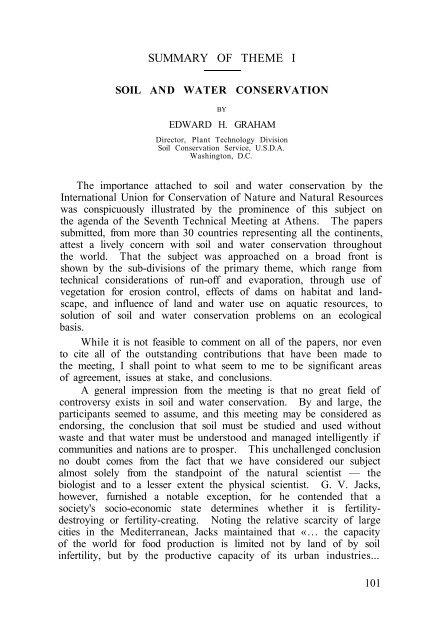septième réunion technique seventh technical meeting ... - IUCN
septième réunion technique seventh technical meeting ... - IUCN
septième réunion technique seventh technical meeting ... - IUCN
- No tags were found...
You also want an ePaper? Increase the reach of your titles
YUMPU automatically turns print PDFs into web optimized ePapers that Google loves.
SUMMARY OF THEME I<br />
SOIL AND WATER CONSERVATION<br />
BY<br />
EDWARD H. GRAHAM<br />
Director, Plant Technology Division<br />
Soil Conservation Service, U.S.D.A.<br />
Washington, D.C.<br />
The importance attached to soil and water conservation by the<br />
International Union for Conservation of Nature and Natural Resources<br />
was conspicuously illustrated by the prominence of this subject on<br />
the agenda of the Seventh Technical Meeting at Athens. The papers<br />
submitted, from more than 30 countries representing all the continents,<br />
attest a lively concern with soil and water conservation throughout<br />
the world. That the subject was approached on a broad front is<br />
shown by the sub-divisions of the primary theme, which range from<br />
<strong>technical</strong> considerations of run-off and evaporation, through use of<br />
vegetation for erosion control, effects of dams on habitat and landscape,<br />
and influence of land and water use on aquatic resources, to<br />
solution of soil and water conservation problems on an ecological<br />
basis.<br />
While it is not feasible to comment on all of the papers, nor even<br />
to cite all of the outstanding contributions that have been made to<br />
the <strong>meeting</strong>, I shall point to what seem to me to be significant areas<br />
of agreement, issues at stake, and conclusions.<br />
A general impression from the <strong>meeting</strong> is that no great field of<br />
controversy exists in soil and water conservation. By and large, the<br />
participants seemed to assume, and this <strong>meeting</strong> may be considered as<br />
endorsing, the conclusion that soil must be studied and used without<br />
waste and that water must be understood and managed intelligently if<br />
communities and nations are to prosper. This unchallenged conclusion<br />
no doubt comes from the fact that we have considered our subject<br />
almost solely from the standpoint of the natural scientist — the<br />
biologist and to a lesser extent the physical scientist. G. V. Jacks,<br />
however, furnished a notable exception, for he contended that a<br />
society's socio-economic state determines whether it is fertilitydestroying<br />
or fertility-creating. Noting the relative scarcity of large<br />
cities in the Mediterranean, Jacks maintained that «... the capacity<br />
of the world for food production is limited not by land of by soil<br />
infertility, but by the productive capacity of its urban industries...<br />
101
















